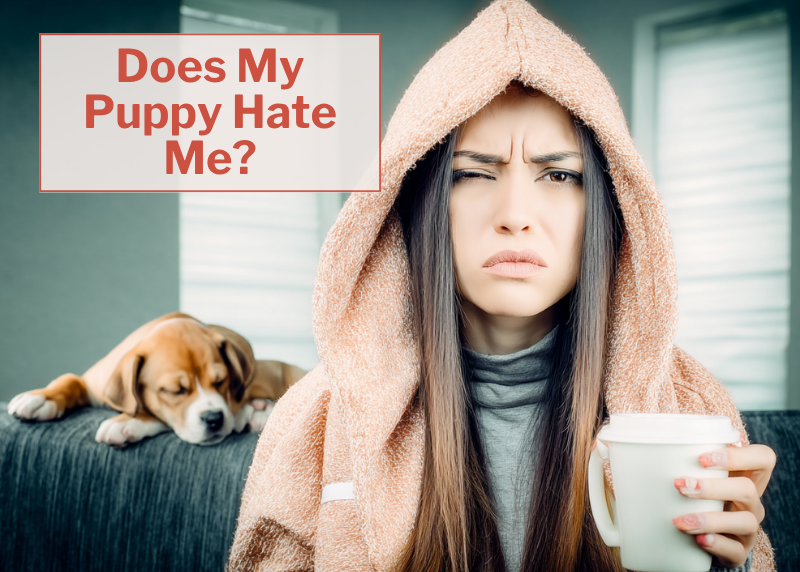Let’s be honest: you didn’t bring home a puppy expecting to be side-eyed, ignored, or—gasp—denied snuggles. And yet, here we are. If you’ve ever sat on the floor with open arms and a hopeful squeaky voice only to watch your puppy trot the other way, you’re probably wondering: does my puppy hate me?
Before you spiral into an emotional pit fueled by sad TikToks and your puppy’s refusal to make eye contact, take a deep breath. You’re not alone, and good news! Your pup probably doesn’t hate you at all. In fact, what feels like emotional rejection is often just miscommunication. Puppies are quirky little creatures with floppy ears, zoomie energy, and a complete lack of understanding of your very human feelings.
That’s where this guide comes in. We’re going to break down what your puppy’s behavior really means, why they might be acting distant, and most importantly, how to build a rock-solid bond that’ll turn your “maybe they hate me” energy into “we finish each other’s snacks” energy.
So, first-time dog parents, grab your matcha, cuddle your own dog (if they’ll allow it), and let’s decode those cold puppy vibes together. ??
Puppy Aloofness – What’s Really Going On?
So, your tiny furball isn’t exactly rushing into your arms like a rom-com reunion scene. In fact, they might be avoiding eye contact, turning their back on you, or even slowly backing away like you’re holding a vacuum instead of a treat. Before you start googling “puppy betrayal,” let’s talk about what’s actually happening.
Many new dog owners misinterpret their puppy’s behavior as emotional rejection. But in reality, your pup is just learning how to exist in a very loud, very weird human world. Their body language is their first language, and sadly, most of us are still working with subtitles.
Some signs that may look like your puppy doesn’t like you are actually signs of nervousness or uncertainty. For example:
- Avoiding direct eye contact? That’s polite in dog culture.
- Refusing pets or cuddles? They might be overstimulated or unsure.
- Keeping a bit of distance? They’re learning personal boundaries. (Honestly, respect.)
Here’s the good news: these are normal behaviors for puppies. Just like toddlers, they have big feelings, no filters, and zero chill. Your job as a dog parent isn’t to take it personally it’s to learn their cues and meet them with patience.
According to the AKC’s guide on dog body language, things like tail position, ear movement, and yawning can say way more than a bark ever could. So, if your pup is giving you side-eye, chances are they’re not saying “I hate you.” They’re probably saying, “I’m confused. Also, I may poop on this rug. TBD.”
Learning to read your dog’s behavior means you’ll begin to see the world from their (much lower) perspective. And once you do that? You’re on your way to becoming their best friend, even if they currently think your hugs are suspicious.
Why Is My Puppy Acting Distant? (Hint: It’s Not About You)
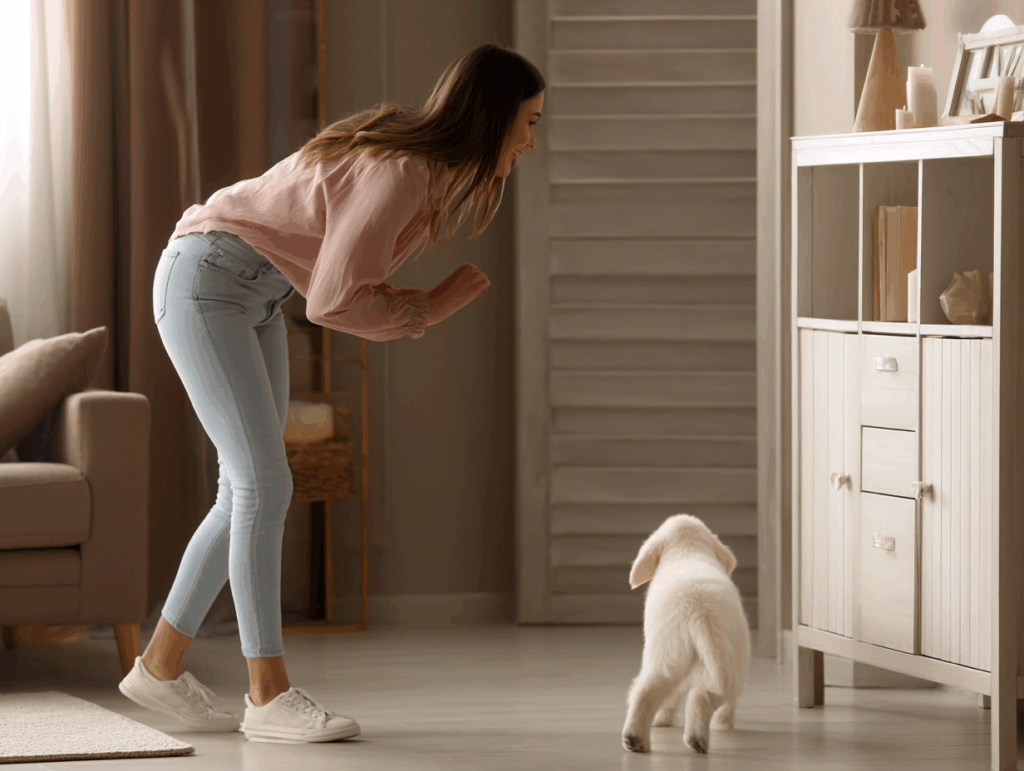
Let’s get one thing straight: if your puppy seems distant, it’s almost never personal. I know, it feels personal when they’d rather chew drywall than lay next to you. But just like us after a too-social weekend, sometimes puppies need space. Their little brains are constantly processing new smells, textures, noises, and oh yeah, your entire lifestyle. It’s a lot.
Some of the most common reasons puppies act standoffish include:
They’re adjusting to a new environment
Your home may be your cozy sanctuary, but to your puppy, it’s the set of a sci-fi thriller: strange floors, whirring machines, unpredictable humans in socks. Their brain is in overdrive trying to figure out where to potty, what to chew, and whether that ceiling fan is friend or foe.
They’re overwhelmed or overtired
Believe it or not, puppies can get cranky when they miss their nap window, just like a toddler hopped up on juice boxes. And when exhaustion hits, some puppies turn into adorable little monsters. If your puppy suddenly gets mouthy or seems irritable during play, it could be fatigue.
Need more on that? Check out our post on Puppy Aggression: When Tiredness Gets Rough Fast for a deep dive into nap-induced naughtiness.
Even young pups can carry early baggage. A shaky start, like being weaned too early or coming from a chaotic shelter, can impact how trusting and affectionate they are. This doesn’t mean your puppy is broken. It means they need gentle consistency and a safe space to decompress.
You might notice signs of past trauma like:
- Skittishness around loud noises
- Avoidance of certain people or touch
- General nervousness in new settings
The VCA’s guide to fear periods and socialization explains that even well-adjusted puppies can suddenly seem aloof during normal developmental shifts. These phases will pass, but only if you meet them with calm energy and lots of treats.
Destructive behavior ≠ Dislike
Okay, real talk: if your puppy chews your favorite shoes, digs through your laundry, or launches a full-blown sock rebellion, it’s not a statement on your relationship. It’s a statement on their energy level. Puppies are expert explorers and zero-percent subtle.
Sometimes, what looks like rebellion is just misdirected enthusiasm. Redirecting them toward appropriate toys and consistent training is key. But don’t worry, we’ll cover that bonding magic in the next section.
So no, your puppy isn’t giving you the cold shoulder out of spite. They’re navigating their new world the only way they know how, with instinct, curiosity, and the occasional public tantrum. ?♀️
Does My Puppy Hate Me… or Just Need Space?
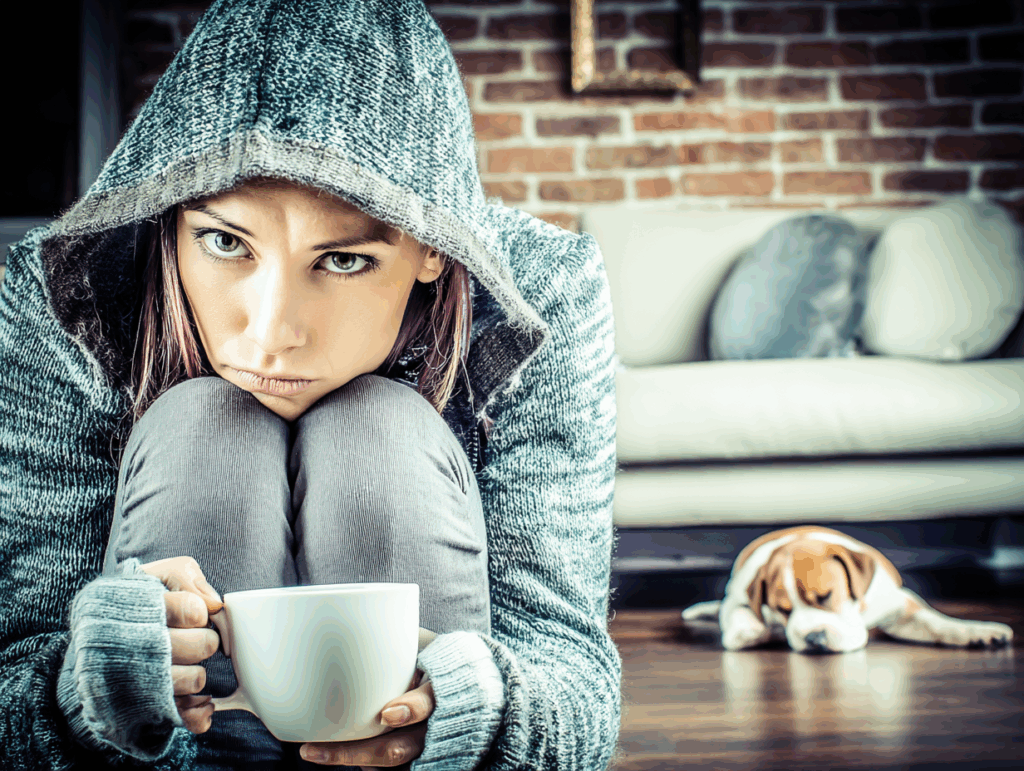
It’s the question that haunts you while you sob softly into your oat milk latte: does my puppy hate me, or are they just not that into snuggling right now?
Here’s the truth: your puppy isn’t trying to hurt your feelings, they’re just navigating a wild cocktail of brain development, body changes, and sensory overload. What might feel like emotional rejection is more likely… nap-related. Or teething. Or a puppy fear phase. Or honestly, all three at once.
Puppies Need More Sleep Than You Think
On average, puppies sleep 18 to 20 hours a day. That means your puppy spends more time dreaming about squirrels than actually interacting with you. If they’re being aloof, they might just be tired, and your “wanna play?!” energy may not be the vibe.
A sleepy pup will often retreat to a corner, hide under furniture, or flat-out ignore you. That doesn’t mean they’re done with you forever; it means they’re prioritizing REM over fetch. (Relatable.)
Fear Periods Are Real—and Weird
Between 8–10 weeks and again around 5–7 months, many puppies go through developmental “fear periods.” During these phases, your confident cutie might suddenly act like your throw pillow is a threat and your hugs are a war crime.
This is totally normal. Your puppy’s brain is temporarily rewiring itself to understand what’s safe and what’s not, which means they may suddenly be unsure about you. Don’t take it personally. Instead, keep things low-key and positive.
Not sure if their behavior is just a phase or something more? Think about their routine. Are you asking too much too soon? Are they getting too much or too little exercise?
This is a good time to revisit our post on how far and how long to walk a 12-week-old puppy to make sure you’re not overdoing it.
Some Puppies Are Just… Independent
Like people, puppies have different personalities. Some are stage-five clingers, while others lean introvert. An independent puppy might seem distant, but they’re usually confident and secure, they don’t need to be attached at the hip to love you.
If your own dog takes their sweet time warming up to closeness, that’s okay. Love languages aren’t just for humans. Some puppies give affection in their own way (like sitting 2 feet away from you in stoic silence).
So while you might be tempted to whisper “why don’t you love me” at 2 am while your puppy snoozes in the other room, just remember: space doesn’t equal rejection. It means you’re raising a well-adjusted pup who knows how to regulate, yay, you! ?
How to Build a Better Bond (Even If They’re Giving You Side-Eye)
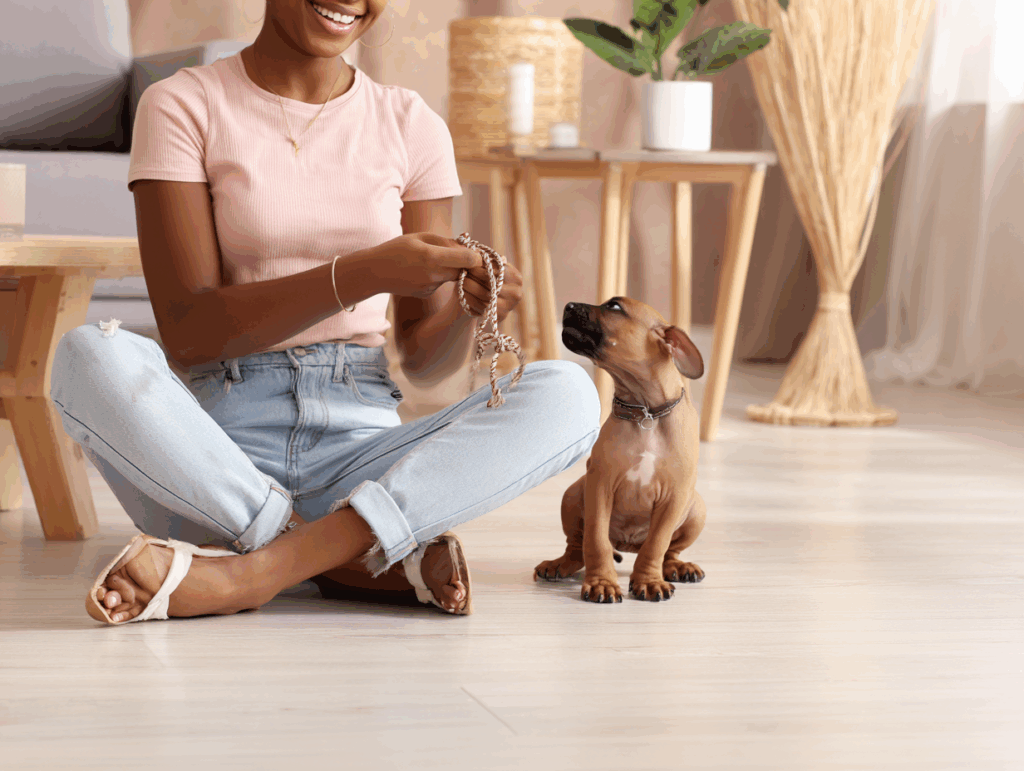
Okay, so your puppy isn’t exactly co-starring in your cuddle montage just yet. The good news? Building trust with your pup isn’t a one-shot deal, it’s a long game. And as every seasoned dog parent eventually learns, the awkward “do you even like me?” phase is just a stepping stone to BFF status.
Here’s the best way to bridge the gap between “mild roommate” and “can’t live without you.”
Start with the Treat Economy
Food is the universal language of love. Use it to your advantage.
Every time your puppy comes near you voluntarily, offer a treat. This creates a positive association with your presence, especially if they’ve been hesitant. Just sitting together calmly and tossing a soft treat can be enough. No touching required. You’re basically the snack bar now.
Below are my pup’s current favorite dog treats (variation is key, as your puppy can get bored with the same treat over and over).
Let Them Come to You
The best way to bond with a cautious or aloof pup? Give them control.
Sit on the floor (bonus points for fuzzy socks) and simply exist. Let your puppy sniff, explore, or ignore you. The goal isn’t immediate affection; it’s comfort. In the dog world, the ability to choose makes them feel safe. You’ll be surprised how often they circle back when they realize you’re not putting pressure on them.
Respect the Crate—It’s Their Zen Den
If your puppy bolts into their crate like it’s a panic room every time you move, don’t take it personally. Crates aren’t just tools; they’re a source of comfort. When used correctly, crates help pups self-soothe, decompress, and feel secure in the chaos of city life.
Need help choosing the right one? We’ve got you:
– What Size Crate Should You Get for Your Puppy?
And if you’re not sure how long is too long?
– Should You Crate Your Dog While at Work? Pros & Cons Explained
Crate time isn’t punishment, it’s peace. You’re not being rejected, you’re giving them breathing room. That’s love.
Bond Through Play, Not Just Pets
Some puppies aren’t super touchy-feely. That’s okay! Playtime can be just as meaningful as cuddle time.
Use tug toys, puzzle feeders, or hide-and-seek games to connect. Lick mats are popular as well, we have a blog post on how you can make your own DIY dog lick mat as well as 18 recipe’s to try at home!
These activities are great because they:
- Build trust through fun
- Engage their brain (and prevent destructive behavior)
- Give you both something to look forward to
Still not sure how to win your puppy’s trust? This Fear Free Happy Homes guide offers gentle strategies that reinforce safety and connection.
Give It Time—Seriously, So. Much. Time.
I know. You want to fast-forward to the part where they leap into your arms like a Hallmark movie. But real bonding takes much time, weeks, even months. Especially for sensitive or independent puppies.
Celebrate small wins:
- They wagged their tail at you? Win.
- They didn’t flinch when you reached toward them? Double win.
- They sat next to you on the couch without bolting? Go ahead and sob with joy.
Your job isn’t to rush the process, it’s to show up, stay consistent, and hold space (literally and emotionally).
Bonding with your pup isn’t always glamorous, but it’s real. And over time, your patience and care will turn you into their best friend, even if they still prefer sleeping next to you instead of on you.
When to Worry – Red Flags in Puppy Behavior
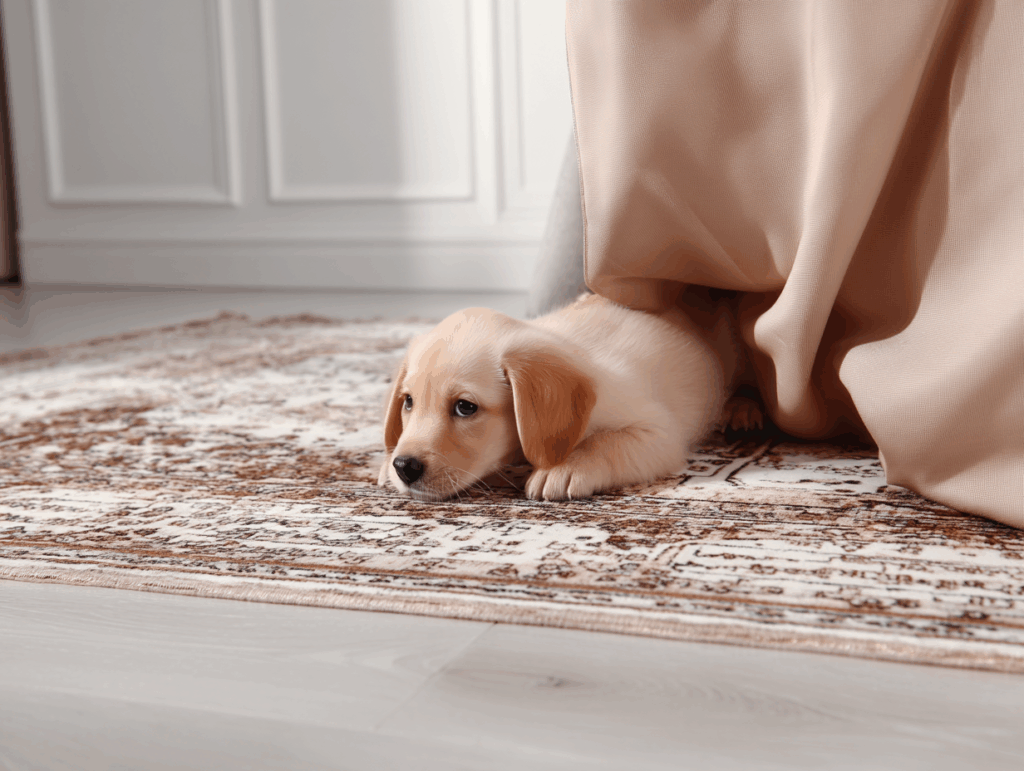
Let’s be real: most puppy behavior is chaotic but harmless. However, there are moments when the whole “maybe they’re just independent” mindset needs a little side-eye. Because while it’s totally normal for a puppy to need space, it’s not normal if their actions are rooted in fear, pain, or serious stress.
Here’s how to tell the difference.
Repeated Aggression
A growl here and there? Totally normal, it’s how dogs communicate discomfort. But if your puppy consistently growls, snaps, or tries to bite you during everyday activities (like petting or feeding), that’s worth noting.
This could stem from:
- Past trauma
- Negative experiences with humans before you
- Fear-based guarding or resource protection
It’s not about dominance; it’s about survival instincts. And your dog’s behavior is telling you they don’t feel safe.
Destructive Behavior Beyond Normal Puppy Energy
Chewing slippers? Expected. Eating drywall, ripping furniture, or frantically digging at doors? That’s a cry for help.
Severe destructive behavior could indicate:
- Separation anxiety
- Under-stimulation
- Unresolved fear or trauma
And while training can help, this might be a situation where you need professional support.
Persistent Avoidance or Shutdown
If your puppy:
- Freezes when you approach
- Refuses food consistently
- Hides all day, every day
…we’re not just dealing with an aloof personality. We’re likely dealing with fear, sensory sensitivity, or a traumatic imprint.
In these cases, we recommend consulting a certified dog behaviorist or your vet. The American Veterinary Society of Animal Behavior is a fantastic resource for finding qualified help near you.
Something Feels Off
At the end of the day, dog parents have gut instincts, too. If your puppy’s body feels stiff all the time, or they flinch when touched, even after weeks of gentle interaction, it’s okay to say, “Something isn’t right.”
Getting support doesn’t mean you failed. It means you’re listening to your pup and choosing connection over confusion. That’s a win.
Not every behavior is a red flag, but when something feels off, don’t dismiss it. Trust, like tail wags, takes time, and sometimes, a little outside help.
Your Puppy’s Not Ghosting You – They’re Just Learning
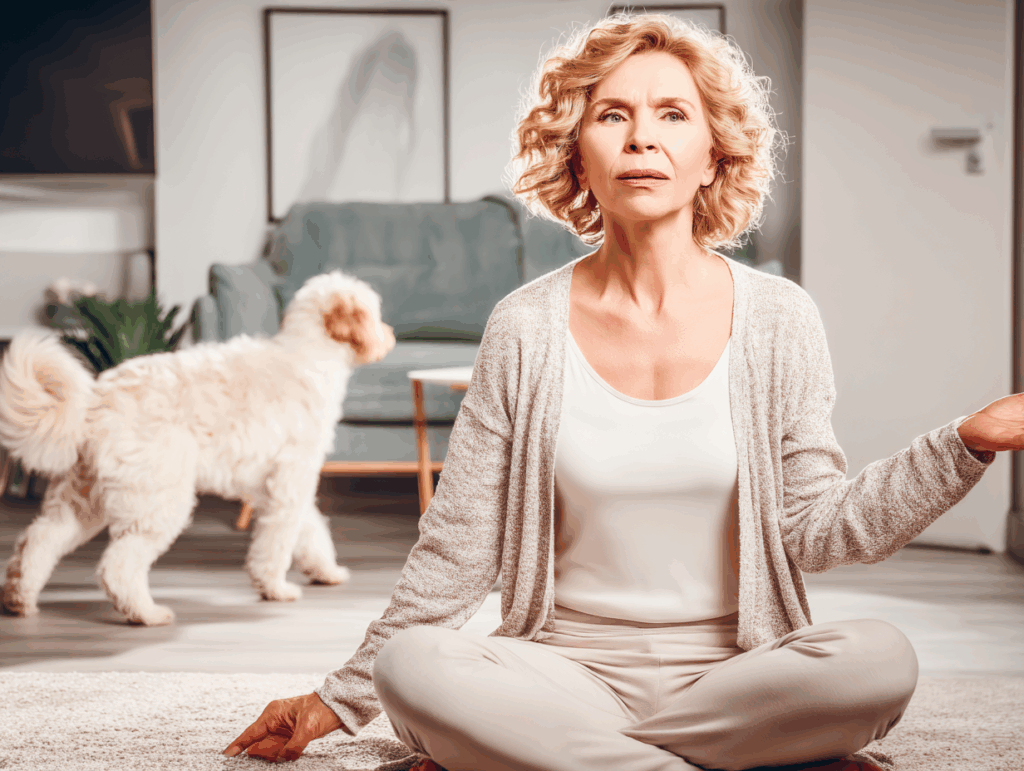
Look, we’ve all been there: you reach out to pet your puppy and they straight-up walk away like you’re a telemarketer. It’s easy to feel ghosted. But here’s the thing:
Your puppy isn’t rejecting you. They’re just in a learning phase. Everything is new to them, including how to be in a relationship (yep, even with you). They’re figuring out your routines, your moods, and why on earth you keep offering “boops” to their nose like it’s a sacred ritual.
That’s not hate. That’s education.
Progress Isn’t Linear (And That’s Okay)
One day your pup is following you from room to room. The next, they’re pretending you don’t exist unless you’re holding cheese. This back-and-forth is normal. Growth, bonding, and trust happen in squiggly little loops, not straight lines.
So if today felt like a bust? Don’t worry. There’s always a next time. You’ll get another chance to connect, and next time, it might feel even better.
Good News: You’re Already Doing the Work
The fact that you’re even wondering, “does my puppy hate me?” means you care. And caring is the foundation of every strong human-dog bond. You’re showing up. You’re learning. You’re offering treats with the enthusiasm of a Golden Retriever at brunch.
And that’s the good news, because that consistency will pay off.
In time, you’ll go from “the tall person with the snacks” to “their absolute best friend in the world.”
Bonus: This Applies to Potty Training, Too
If your puppy’s emotional signals are giving you mixed messages, just wait until you dive into toilet time. Trust, patience, and reading cues are critical there too.
Need help with that adventure? Check out Potty Training Small Dogs: 10 Expert Tips for New Pet Parents,because learning to communicate goes beyond cuddles.
Your puppy is a work in progress. But so are you. And together, you’ll figure this out, awkward side-eyes and all.
❓ FAQ: Does My Puppy Hate Me? (Spoiler: No, But Let’s Talk)
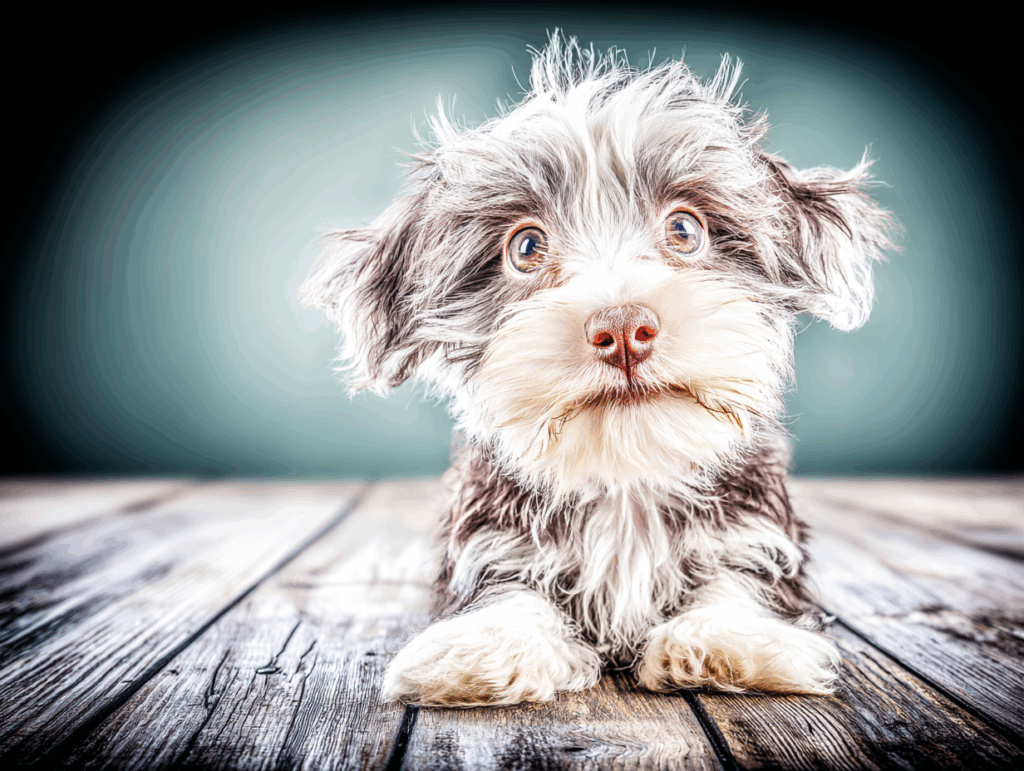
1. Why does my puppy run away from me?
Usually, it’s not rejection, it’s regulation. Puppies often run away when they’re overstimulated, tired, or unsure. Give them space and let them approach you on their terms. You’ll get more snuggles in the long run.
2. Does my puppy hate me if they don’t want to cuddle?
Not at all. Some puppies prefer floor naps over laps. Affection looks different for every dog. Observe their body language, some show love by following you from a distance or flopping nearby like a dramatic loaf.
3. Why doesn’t my puppy listen to me?
Puppies aren’t born knowing your expectations. They’re distracted, learning, and sometimes teething through the pain. Training takes much time, consistency, and positive reinforcement, not to mention snacks. Lots of snacks.
4. What’s the best way to build trust with my puppy?
The best way is to offer safety, routine, and zero pressure. Let them initiate contact, reward engagement with treats or toys, and keep interactions short and positive. Bonus: don’t loom over them like a well-meaning skyscraper.
5. Is it normal for my puppy to ignore me sometimes?
Yes! Puppies tune out when they’re tired, overstimulated, or focused on chewing something important (like your shoelace). It’s not about you, it’s about attention span. Hang in there.
6. Could past trauma be why my puppy avoids me?
It’s possible. Even very young dogs can carry stress from past trauma or chaotic early environments. This can show up as flinching, cowering, or retreating. Gentle repetition and enrichment can help build safety.
7. How can I tell the difference between independence and fear?
Watch their emotional responses:
- Independence = relaxed body, curiosity, tail wagging
- Fear = stiffness, hiding, avoiding touch
If your dog’s behavior seems nervous rather than neutral, go slow and consider professional help if it persists.
8. Is destructive behavior a sign my puppy doesn’t like me?
Nope. Destructive behavior is almost always about energy, boredom, or anxiety, not revenge. Your couch isn’t a casualty of hate; it’s just very chewable. Redirect and enrich, don’t take it personally.
9. How long does it take to bond with a puppy?
It varies, days for some, months for others. It depends on age, temperament, and background. Give it much time, be consistent, and celebrate tiny wins (like tail wags or soft eye contact). You’re doing great.
10. Should I worry if my puppy still seems distant after a few weeks?
It depends. If they’re eating, sleeping, and occasionally engaging, you’re likely fine. But if you see red flags, like aggression, extreme avoidance, or refusal to eat, it may be time to check with your vet or a behaviorist.
You got it! Here’s your warm, affirming, and slightly cheeky Conclusion to wrap up the post with encouragement for every overwhelmed dog mom who’s ever googled “does my puppy hate me.”
You’re Doing Great, Pup Parent!
If your puppy could talk, they’d probably say something like, “Thanks for the snacks, sorry I chewed your laptop cord, and I’m still figuring out how to be a whole dog in this big, noisy world.”
The truth is, your puppy doesn’t hate you. Not even close. They’re growing, learning, and navigating every sound, surface, and sock like it’s a mystery novel. And while they might seem indifferent at times, the bond you’re building beneath the chaos? That’s real.
So next time you’re sitting on the floor with a treat in one hand and existential dread in the other, remember:
- Puppies need space, sleep, and so much time
- You don’t need instant affection to be a great dog parent
- And no, your dog is not plotting emotional sabotage (promise)
You’re showing up. You’re trying. You’re googling at midnight. And that? That makes you a best friend in training, with excellent taste in throw pillows.
Keep going. You’ve got this. ?✨

